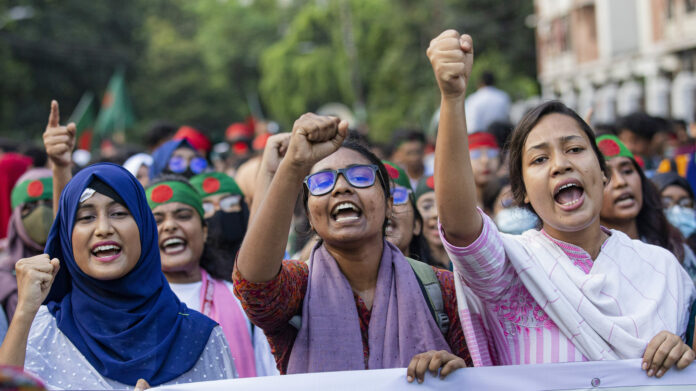
Students shout slogans during a protest demanding the trial of former Prime Minister Sheikh Hasina in Dhaka, Bangladesh, Tuesday, Aug. 13, 2024.
Rajib Dhar/AP
hide caption
toggle caption
Rajib Dhar/AP

Students shout slogans during a protest demanding the trial of former Prime Minister Sheikh Hasina in Dhaka, Bangladesh, Tuesday, Aug. 13, 2024.
Rajib Dhar/AP
Earlier this month, student protestors filled the streets of Dhaka, Bangladesh, in opposition to a controversial quota system for government jobs.
Authorities then cracked down on demonstrators, blocking internet access, imposing a curfew and issuing police officers a shoot-on-sight order. In just over a month, more than 600 people have been killed.
And as the protests escalated, the demonstrations started to become about much more than just the quota system, says Shahidul Alam, a photojournalist, writer and activist based in Dhaka.
The students then began calling for the resignation of former Prime Minister Sheikh Hasina.
“The quota really was the tip of the iceberg. It could have been dealt with, but once it wasn’t, then the whole tinderbox exploded,” he says.
Unrest continued, and on August 4th, nearly 100 people were killed in a police crackdown, causing outrage. Just a day later, Hasina was forced to resign. Soon after, protestors overran her residence, and she fled the country.
The students who ousted Hasina are now helping to lead Bangladesh.
“We youth are not only the generation of Facebook, YouTube and Instagram,” says 19-year-old protestor Mumtahana Munir Mitti.
“We also love our country. And we also love to participate in [the] rebuilding of our country”
You’re reading the Consider This newsletter, which unpacks one major news story each day. Subscribe here to get it delivered to your inbox, and listen to more from the Consider This podcast.
Rebuilding the government
Earlier this month, Nahid Islam was a graduate student studying sociology at the University of Dhaka.
Now, he is leading two ministries within Bangladesh’s interim government. At 26 years old, he serves as the Minister of Posts, Telecommunications and IT, and Minister of Information and Broadcasting.
When Hasina was in power, Islam was arrested. He says he was tortured by the government. Now, he feels free.
“Sheikh Hasina’s government was an authoritarian and fascist government,” he says.
“And now a free moment has [been] created in Bangladesh, and I can breathe in the free air of Bangladesh.”
Rebuilding the government is hard work, he says. He says he has been regularly working 16-hour days.
“Because in the interim government, the members are only 17 or 18, and there are many ministries. And there are also many advisers who also have to take two or three ministries.”
And even though those running the new government are young and lack political experience, he is confident the interim government represents the people of Bangladesh.
“We, the students, lead the movement and the revolution. The political forces, existing forces of Bangladesh, failed. As a student can lead a movement, lead a revolution, a student can also form a government, can also lead the government.”
The future of Bangladesh
Bangladesh’s new interim leader is Nobel laureate Muhammad Yunus. But because the current leaders are not elected officials, the government is not meant to enact new policies.
Still, Nahid Islam hopes to enact change before the country holds elections.
“We want a new political settlement, which will pave the way for a democratic transition, party democracy and rule of law.”
Constitutional reform is at the top of his priorities, Islam says.
“Our constitution is one man-centric, and the prime minister has all of the power…so we have to reform the constitution. We have to reform the election commissions and we have to eradicate corruption. We have to reconstruct the country system and government system first, then we can go for an election.”
This episode was produced by Jonaki Mehta and Brianna Scott. It was edited by Justine Kenin. NPR international correspondent Diaa Haddid contributed reporting. Our executive producer is Sami Yenigun.



